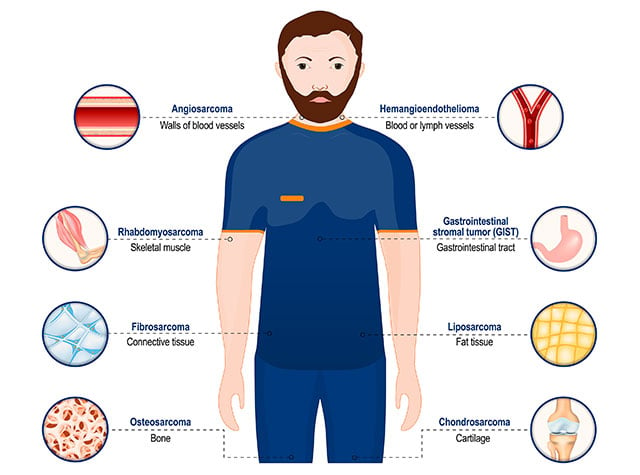Types
There are two main types of sarcoma. Most sarcomas develop in the muscles, blood vessels or other soft tissues of the body, and are known as soft tissue sarcomas. A smaller number of sarcomas develop in the bone, and are known as bone cancers or bone sarcomas.
Within these two categories, there are more than 70 unique types of sarcoma, each one indicating wherein the bone or soft tissue the cancer developed. These are considered subtypes. The most common sarcoma subtypes include:
- Angiosarcoma (vascular sarcoma), which develops in the cells that create the walls of blood cells or lymphatic vessels
- Chondrosarcoma, which develops in cartilage cells
- Clear cell sarcoma, which usually originates in deep soft tissues surrounding the muscles and tendons in the lower legs and feet
- Dermatofibrosarcoma protuberans (DFSP), which develops in skin
- Epithelioid sarcoma, a soft-tissue tumor that often originates under the skin of a finger, hand, forearm, lower leg or foot
- Ewing's sarcoma, which develops in immature soft tissue or bone cells
- Fibrosarcoma (fibroblastic sarcoma), which develops in fibrous tissue
- Gastrointestinal stromal tumors, which develop in the cells that line the gastrointestinal tract
- Kaposi sarcoma, which develops in the cells that line the inside of blood cells or lymphatic vessels
- Leiomyosarcoma, which develops in the smooth muscles of the organs in the abdomen and pelvis
- Liposarcoma, which develops in fatty tissue
- Myeloid sarcoma, a form of blood cancer that develops outside the bone marrow
- Osteosarcoma, which develops in the cells that create bones
- Pleomorphic sarcoma, which develops in the soft tissues of the arms, legs and abdomen
- Retroperitoneal sarcoma, which is a tumor that forms in the retroperitoneum, an area at the back of the abdominal cavity near the kidneys and pancreas
- Rhabdomyosarcoma, which develops in the cells that create skeletal muscles
- Spindle cell sarcoma, which typically originates in a long bone such as in an arm or leg
- Synovial sarcoma, which develop in the cells near the joints and tendons

At Moffitt Cancer Center, we have the experience needed to treat all types of sarcoma, from the most common to rarer forms. We offer a complete range of treatments, and our oncologists recommend the best combination of options for each patient’s specific diagnosis. All of our treatments are available in a single, convenient location, and no referrals are required to make an appointment.
To learn more about the different types of sarcoma, call 1-888-663-3488 or submit a new patient registration form online.
Diagnosis & Treatment
